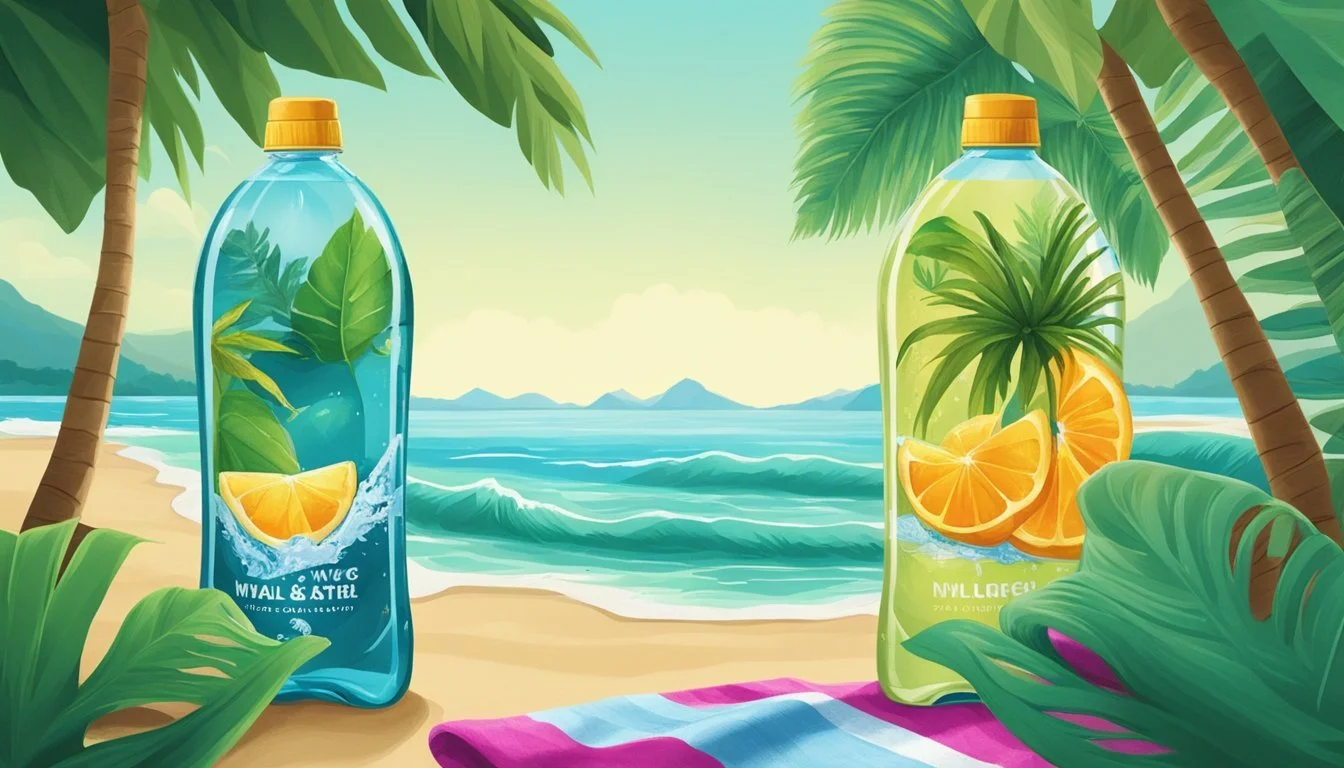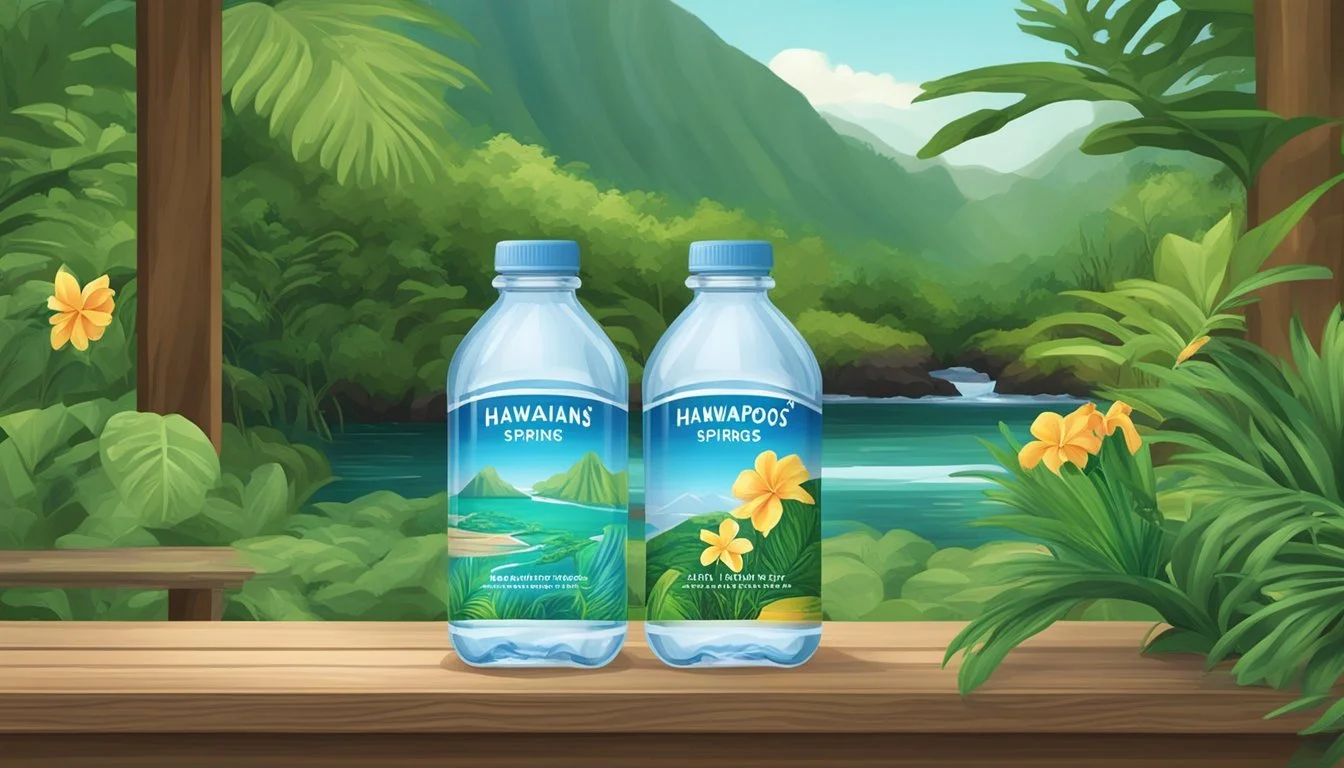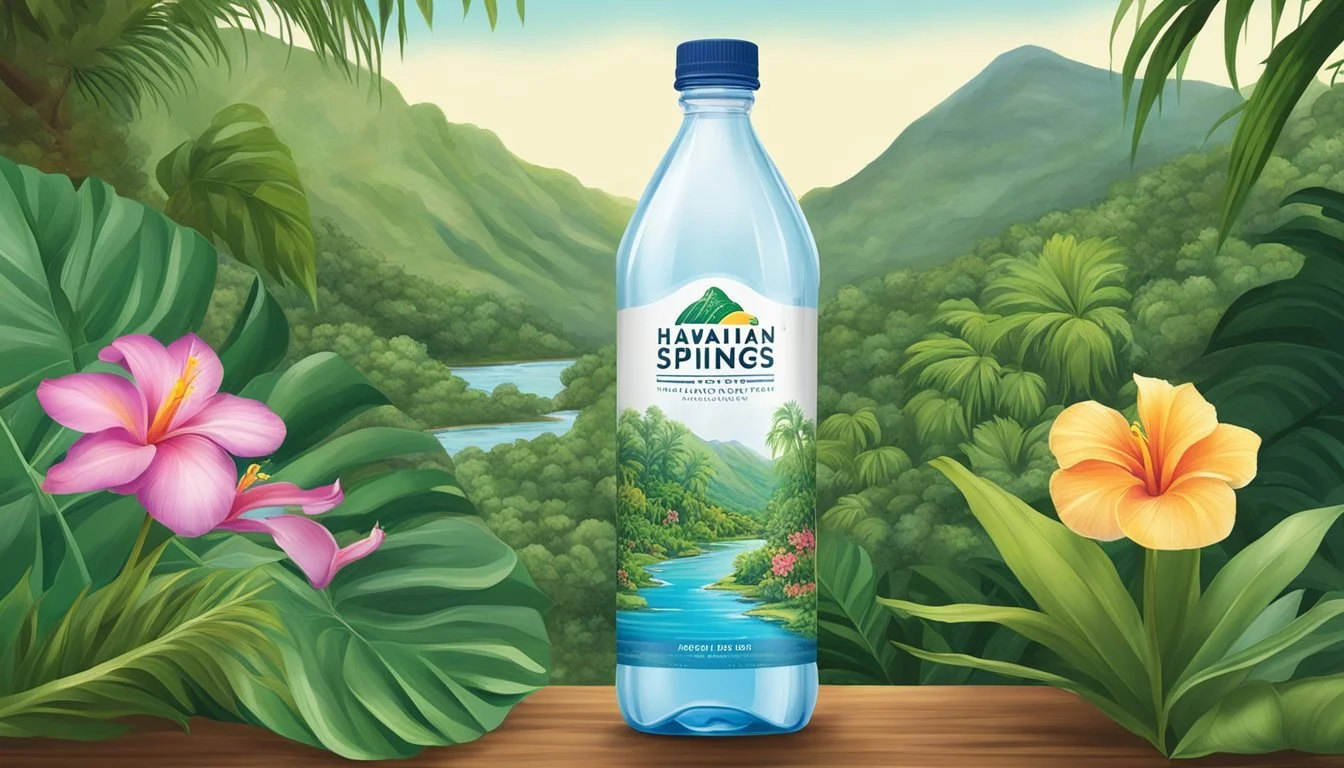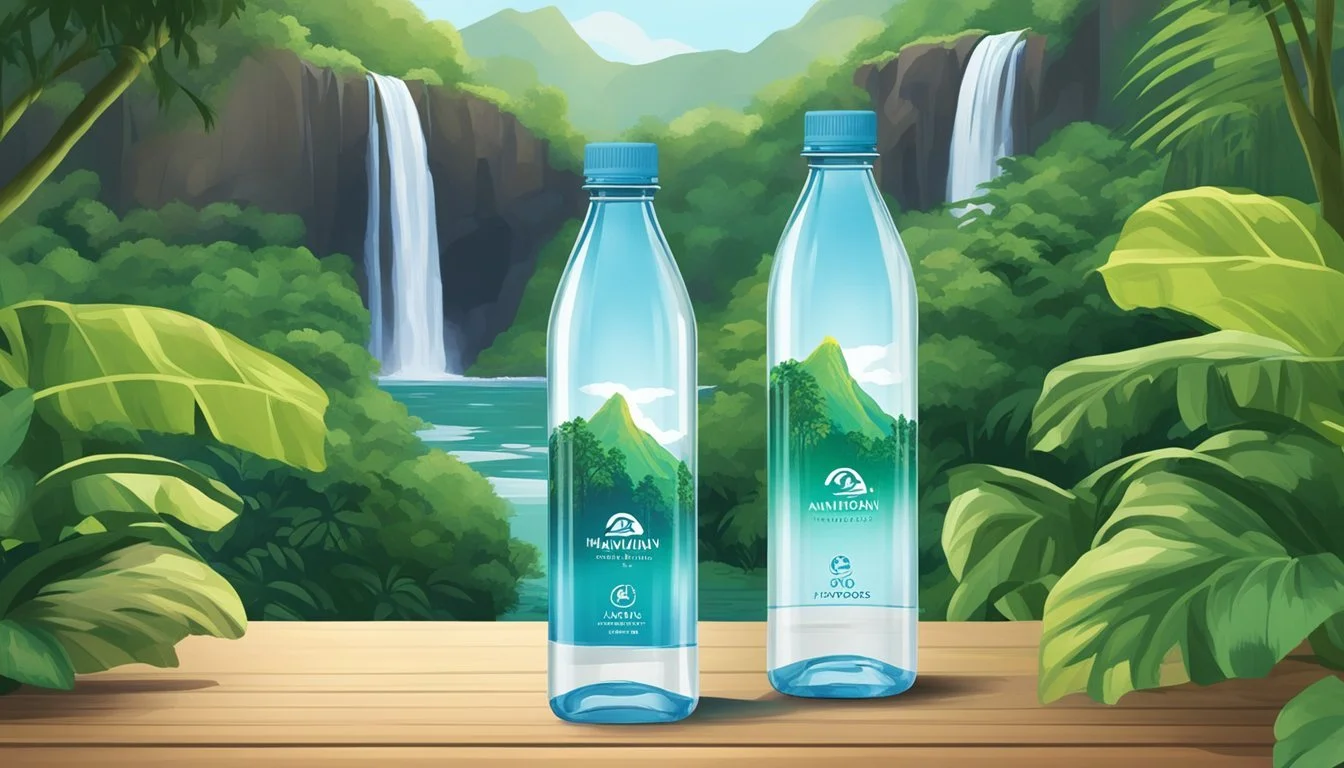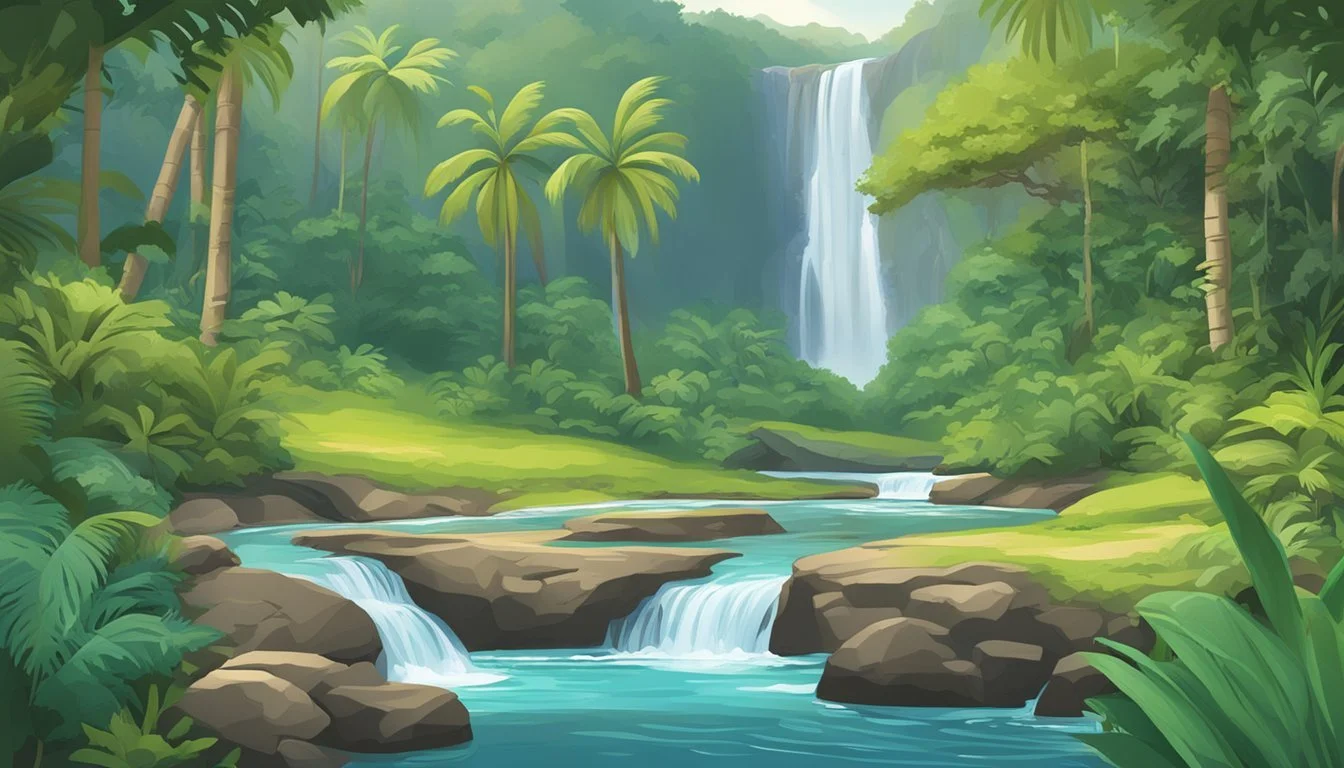Hawaiian Springs vs. Antipodes
Which Bottled Water is Better?
Hawaiian Springs and Antipodes are two prominent names in the bottled water market, each offering unique attributes that appeal to discerning consumers. Hawaiian Springs, sourced from the Big Island of Hawaii, boasts a pH level of 7.7 and a refreshingly smooth taste. On the other hand, Antipodes originates from New Zealand and is known for its pure and crisp profile, making both options highly appealing.
For those seeking a taste rooted in the volcanic origins of Hawaii, Hawaiian Springs offers a distinct mineral profile that many find unparalleled. Meanwhile, Antipodes provides a clean and neutral flavor, thanks to its pristine source in New Zealand, which many water aficionados appreciate for its simplicity.
Deciding between Hawaiian Springs and Antipodes ultimately hinges on personal preference for taste and source. Both brands have carved out a niche in the market by offering high-quality, refreshing bottled water, making this comparison a compelling topic for any bottled water enthusiast.
Understanding Bottled Water
Bottled water comes in various forms, each with distinct qualities. Additionally, regulatory standards ensure safety and quality, while environmental concerns highlight the impact of plastic bottles.
Types of Bottled Water
Bottled water can be classified into spring water, purified water, and mineral water.
Spring water originates from underground sources and natural springs which contribute to its unique mineralogy. Brands like Hawaiian Springs tap into such sources.
Purified water, including distilled or reverse-osmosis water, undergoes a thorough purification process, eliminating impurities and contaminants, resulting in a clean product.
Mineral water contains naturally occurring minerals obtained from its source, benefiting from the unique geology of the region.
Regulatory Standards
The quality and safety of bottled water are regulated by the EPA and FDA.
The EPA oversees drinking water standards, ensuring contaminants are within safe limits. For bottled water, the FDA enforces these standards and additional labeling requirements.
Bottled water must meet stringent criteria and regular testing for possible contaminants like lead, chlorine, and microbiological organisms to ensure consumer safety. Compliance with these standards guarantees that both spring and purified waters are safe to drink.
Environmental Impact
The environmental impact of bottled water largely stems from the production and disposal of plastic bottles. These processes contribute to resource depletion and pollution.
Using environmentally friendly practices, such as recycling and biodegradable materials, can mitigate this impact. Some companies are adopting alternative packaging to reduce their carbon footprint.
Awareness of the environmental consequences encourages consumers to make responsible choices, supporting brands that prioritize sustainability and eco-friendly initiatives.
Brand Profiles
Hawaiian Springs and Antipodes offer unique histories that highlight their dedication to quality and purity, making them standout choices in the bottled water market.
History of Hawaiian Springs
Hawaiian Springs, established in 1995, sources its water from an artesian aquifer in the Big Island of Hawaii.
The brand prides itself on the exceptional purity and mineral content of its water. This purity results from the natural filtration process through volcanic rock.
The water's balanced mineral content and alkaline pH contribute to its clean and slightly sweet taste, which differentiates it in the market.
Hawaiian Springs has carved a niche for itself by emphasizing sustainability and the pristine nature of its source.
Antipodes' Brand Journey
Antipodes, founded in 2003, originates from New Zealand and takes its water from an artesian aquifer.
The brand focuses on environmental preservation and minimal processing, ensuring its water remains pure and natural.
It's known for a unique taste, attributed to the water’s silica content, which provides a smooth texture.
Antipodes has received accolades for both taste and sustainability, positioning itself as a premium choice for eco-conscious consumers.
Source and Production
Both Hawaiian Springs and Antipodes bottled waters emphasize their unique sources and meticulous production processes, which contribute to their taste and quality.
Water Source Analysis
Hawaiian Springs water originates from renewable aquifers filtered through lava rock in Hawaii. This natural filtration grants it a naturally alkaline pH of 7.7+, contributing to its balanced taste and mineral content. The source ensures the water remains pure, clean, and rich in essential minerals.
Antipodes, on the other hand, sources its water from an artesian aquifer in New Zealand. This groundwater is also naturally filtered, providing a consistently high-quality water with a neutral pH and low mineral content. Originating from deep beneath the earth's surface, it maintains a clean and crisp profile, free from surface pollutants.
Purification and Bottling Processes
Hawaiian Springs leverages a straightforward bottling process, capturing the water directly at the source. The water is harvested immediately after filtration through volcanic rock, ensuring it remains uncontaminated and retains its optimal pH. It is then bottled in fully recyclable containers, emphasizing sustainability.
Antipodes undergoes a rigorous purification process. The water is UV-treated and filtered to remove any impurities while retaining its natural composition. Following this purification, the water is bottled under strict quality controls. The use of high-quality, recyclable glass bottles further ensures that the water's purity is maintained from source to consumer.
Nutritional Comparison
Hawaiian Springs and Antipodes bottled waters differ in their nutritional profiles, particularly in terms of mineral content and the presence of electrolytes. These factors can influence preferences depending on individual hydration needs and health considerations.
Mineral Content
Hawaiian Springs water originates from the slopes of Mauna Loa in Hawaii. Its mineral composition is naturally infused as it filters through volcanic rock, giving it a distinct but subtle profile. Key minerals include calcium, magnesium, and silica. The levels of these minerals are generally low-to-moderate, making it a preference for those who enjoy a smooth, clean taste without a significant mineral aftertaste.
Antipodes water comes from New Zealand and undergoes a natural filtration process through ancient rock formations. This brand is rich in minerals such as bicarbonate, calcium, and magnesium. The bicarbonate content, in particular, can contribute to a slightly alkaline pH, offering potential benefits for digestive health. Antipodes may thus appeal to those seeking mineral-rich water with a mild taste.
Presence of Electrolytes
Electrolytes are vital for maintaining proper hydration and supporting various body functions. Hawaiian Springs water contains natural electrolytes, albeit in lower concentrations. This includes sodium and potassium, which help in maintaining fluid balance and supporting nerve function. The mild electrolyte presence provides a hydrating experience without overwhelming the palate.
Antipodes water also contains naturally occurring electrolytes like sodium, potassium, and magnesium. The higher sodium content in Antipodes can be particularly beneficial for athletes or individuals engaging in intense physical activity, as it aids in retaining water and preventing dehydration. The balanced electrolyte profile makes it a suitable option for those needing enhanced hydration.
Both brands offer unique nutritional benefits through their distinct mineral and electrolyte compositions.
Taste Profile and Water Sommelier Insights
Both Hawaiian Springs and Antipodes offer unique flavor characteristics that are highlighted by water sommeliers. Understanding their taste profiles helps in appreciating the subtleties and differences between these premium bottled waters.
Flavor Characteristics
Hawaiian Springs is often described as having a naturally sweet and smooth taste. It's sourced from the Big Island of Hawaii, where the water is filtered through layers of volcanic rock. This natural filtration process contributes to its clean and crisp finish. The minerality is low to moderate, giving it a light texture on the palate and making it highly refreshing.
Antipodes, sourced from New Zealand, presents a different flavor profile. It offers a silky mouthfeel with a slightly alkaline taste. This water has a higher mineral content, which adds a subtle complexity without overwhelming the palate. The balanced minerality combined with its pristine source contributes to a pure, invigorating taste.
Expert Opinions
Water sommelier insights provide additional depth in understanding these waters. Martin Riese, a well-known water sommelier, often emphasizes the importance of mineral balance in water. He notes that Hawaiian Springs offers an exquisite, delicate sweetness ideal for pairing with light meals or enjoyed on its own. Its volcanic origin is praised for the distinct purity it imparts.
On the other hand, experts appreciate Antipodes for its refined texture and higher minerality. This makes it suitable for pairing with richer foods, as the subtle mineral taste can enhance the overall dining experience. The brand is frequently highlighted in tastings for its ability to remain smooth and well-balanced despite its mineral-rich content.
By comparing the flavor and expert opinions, consumers can better appreciate the distinctive qualities that Hawaiian Springs and Antipodes bring to the table.
Consumer Experience
Consumers frequently consider the packaging appeal and the ease of finding their favorite bottled water brands in stores. Here's a detailed look at how Hawaiian Springs and Antipodes stack up.
Packaging and Branding
Hawaiian Springs water comes in sleek, clear plastic bottles that highlight the purity and simplicity of the product. The label features vibrant colors and an eye-catching design inspired by Hawaiian landscapes. This packaging not only looks good on shelves but also conveys a sense of natural freshness and tropical serenity.
Antipodes, on the other hand, opts for a minimalist glass bottle that emphasizes sophistication and environmental consciousness. Its clean white label with understated graphics suggests luxury and high quality. The glass bottle also ensures that the water tastes as pure as possible, without any plastic aftertaste.
Both brands successfully use their packaging to reflect their geographical origins and brand values, creating a differentiated consumer experience.
Availability and Accessibility
When it comes to availability, Hawaiian Springs can be found in many major grocery stores across the United States, making it a convenient choice for many consumers. It is also available for online purchase, expanding its accessibility.
Antipodes, originating from New Zealand, is less frequently found in everyday grocery stores and may be more commonly encountered in specialty stores or high-end retail outlets. Its presence is stronger in markets that prioritize premium products.
Despite its limited distribution, Antipodes has a strong foothold in the niche market of luxury bottled waters. Both brands provide various purchase options, but Hawaiian Springs is generally more accessible to the average consumer.
Health and Safety
When comparing Hawaiian Springs and Antipodes bottled waters, it's essential to consider their health and safety aspects. Key points to evaluate include quality assurance measures and potential contaminant concerns.
Quality Assurance
Both Hawaiian Springs and Antipodes implement rigorous quality assurance protocols to ensure the water is safe for consumption. Hawaiian Springs emphasizes its commitment to filtration and disinfection processes to maintain high standards. Their water source is regularly tested for various contaminants, ensuring it remains pure.
Antipodes, sourced from a deep aquifer, also boasts stringent quality assurance practices. Their water undergoes thorough filtration and disinfection steps, including minimal use of chlorine, which helps in maintaining a clean, natural taste while ensuring safety.
Both brands conform to Safe Drinking Water standards, reflecting their dedication to consumer health. Quality assurance certificates and periodic tests are available on request from both companies, providing transparency and confidence to buyers.
Contaminant Considerations
Concerns about contaminants such as lead and other harmful substances are minimal with Hawaiian Springs and Antipodes. Hawaiian Springs' water, sourced from Hawaiian aquifers, is naturally filtered through volcanic rock, reducing the risk of heavy metal contamination.
Antipodes water is renowned for its low level of contaminants due to its deep origin and natural filtration process. The brand regularly screens for potential pollutants, ensuring levels remain well below safety thresholds.
Neither brand uses significant amounts of chlorine for purification, preserving water quality and taste. Both provide detailed reports on the contaminants tested, giving consumers peace of mind about the water they are drinking.
Sustainability and Ethics
Examining the sustainability and ethical practices of bottled water brands is crucial in determining their environmental impact and corporate responsibility. This section discusses the environmental footprints and company initiatives of Hawaiian Springs and Antipodes.
Environmental Footprint
Hawaiian Springs sources its water from natural aquifers in Hawaii. The bottling process aims to ensure minimal impact on local water resources. Yet, there's concern over plastic waste and energy use during production and distribution.
Antipodes, sourced from New Zealand, focuses on using glass bottles, which are more environmentally friendly. They also emphasize carbon neutrality by offsetting emissions through verified projects. This approach reduces the ecological footprint associated with their operations.
Company Ethics and Initiatives
Hawaiian Springs engages in local community support and environmental conservation efforts. These include funding projects aimed at protecting Hawaii’s natural resources and promoting sustainable practices among staff and consumers.
Antipodes prioritizes ethical manufacturing, focusing on eco-friendly packaging and sustainable sourcing. Their initiatives include partnerships with environmental organizations and efforts to improve recycling infrastructure. Such endeavors highlight their commitment to ethical standards and environmental sustainability.
Closing Thoughts
Choosing between Hawaiian Springs and Antipodes is a matter of personal preference and priorities. Both brands offer high-quality bottled water with unique characteristics.
Hawaiian Springs is sourced from the Big Island of Hawaii. It's known for its naturally alkaline pH and crisp, clean taste. This water is often praised for its purity and health benefits.
Antipodes comes from New Zealand. It's renowned for its low mineral content and smooth taste. The brand emphasizes sustainability, using plastic-free and recyclable glass bottles.
Flavor profiles vary slightly. Hawaiian Springs has a subtle sweetness, while Antipodes offers a more neutral taste, making it versatile.
Price points differ as well. Hawaiian Springs tends to be more affordable. Antipodes often commands a premium due to its sustainable packaging and production methods.
Both brands support healthy hydration. Antipodes emphasizes sustainability, making it a choice for eco-conscious consumers.
Personal preferences and values will ultimately guide the choice between these two.
More About Hawaiian Springs
Acqua Pana vs Hawaiian Springs: Which Bottled Water is Better?
Aqua Carpatica vs Hawaiian Springs: Which Bottled Water is Better?
Aquafina vs Hawaiian Springs: Which Bottled Water is Better?
Arrowhead vs Hawaiian Springs: Which Bottled Water is Better?
Boxed Water vs Hawaiian Springs: Which Bottled Water is Better?
Castle Rock vs Hawaiian Springs: Which Bottled Water is Better?
Core Hydration vs Hawaiian Springs: Which Bottled Water is Better?
Deer Park vs Hawaiian Springs: Which Bottled Water is Better?
Essentia vs Hawaiian Springs: Which Bottled Water is Better?
Hawaiian Springs vs 1907water: Which Bottled Water is Better?
Hawaiian Springs vs 7-Select: Which Bottled Water is Better?
Hawaiian Springs vs Alkaline88: Which Bottled Water is Better?
Hawaiian Springs vs Big Chill: Which Bottled Water is Better?
Hawaiian Springs vs BodyArmor: Which Bottled Water is Better?
Hawaiian Springs vs Cascade Mountain: Which Bottled Water is Better?
Hawaiian Springs vs CBD Living: Which Bottled Water is Better?
Hawaiian Springs vs Crystal Geyser: Which Bottled Water is Better?
Hawaiian Springs vs Crystal Lake: Which Bottled Water is Better?
Hawaiian Springs vs Essence pH10: Which Bottled Water is Better?
Hawaiian Springs vs Hawaii Volcanic: Which Bottled Water is Better?
Hawaiian Springs vs Kirkland Signature: Which Bottled Water is Better?
Hawaiian Springs vs Liquid Death: Which Bottled Water is Better?
Hawaiian Springs vs Mananalu: Which Bottled Water is Better?
Hawaiian Springs vs Open Water: Which Bottled Water is Better?
Hawaiian Springs vs Proud Source: Which Bottled Water is Better?
Hawaiian Springs vs Pure Life: Which Bottled Water is Better?
Hawaiian Springs vs Purely Sedona: Which Bottled Water is Better?
Hawaiian Springs vs Refreshe: Which Bottled Water is Better?
Hawaiian Springs vs Richard's Rainwater: Which Bottled Water is Better?
Hawaiian Springs vs Simple Truth: Which Bottled Water is Better?
Hawaiian Springs vs Solan de Cabras: Which Bottled Water is Better?
Hawaiian Springs vs Talking Rain AQA: Which Bottled Water is Better?
Hawaiian Springs vs The Well: Which Bottled Water is Better?
Hawaiian Springs vs Tru Alka: Which Bottled Water is Better?
Hawaiian Springs vs Weird Water: Which Bottled Water is Better?
Hawaiian Springs vs Whole Foods 365: Which Bottled Water is Better?
Hawaiian Springs vs Whole Foods Italian Still Mineral water: Which Bottled Water is Better?
Ice Mountain vs Hawaiian Springs: Which Bottled Water is Better?
Icelandic Glacial vs Hawaiian Springs: Which Bottled Water is Better?
Just Water vs Hawaiian Springs: Which Bottled Water is Better?
Mountain Valley Spring Water vs Hawaiian Springs: Which Bottled Water is Better?
Nestle Pure Life vs Hawaiian Springs: Which Bottled Water is Better?
Poland Spring vs Hawaiian Springs: Which Bottled Water is Better?
San Pellegrino vs Hawaiian Springs: Which Bottled Water is Better?
Smartwater vs Hawaiian Springs: Which Bottled Water is Better?
Topo Chico vs Hawaiian Springs: Which Bottled Water is Better?
Zephyrhills vs Hawaiian Springs: Which Bottled Water is Better?
More About Antipodes
Antipodes vs Cascade Mountain: Which Bottled Water is Better?
Antipodes vs Hawaii Volcanic: Which Bottled Water is Better?
Antipodes vs Kirkland Signature: Which Bottled Water is Better?
Antipodes vs Richard's Rainwater: Which Bottled Water is Better?
Antipodes vs Solan de Cabras: Which Bottled Water is Better?
Antipodes vs Talking Rain AQA: Which Bottled Water is Better?
Antipodes vs Whole Foods 365: Which Bottled Water is Better?
Antipodes vs Whole Foods Italian Still Mineral water: Which Bottled Water is Better?
Icelandic Glacial vs Antipodes: Which Bottled Water is Better?
Mountain Valley Spring Water vs Antipodes: Which Bottled Water is Better?
Nestle Pure Life vs Antipodes: Which Bottled Water is Better?


